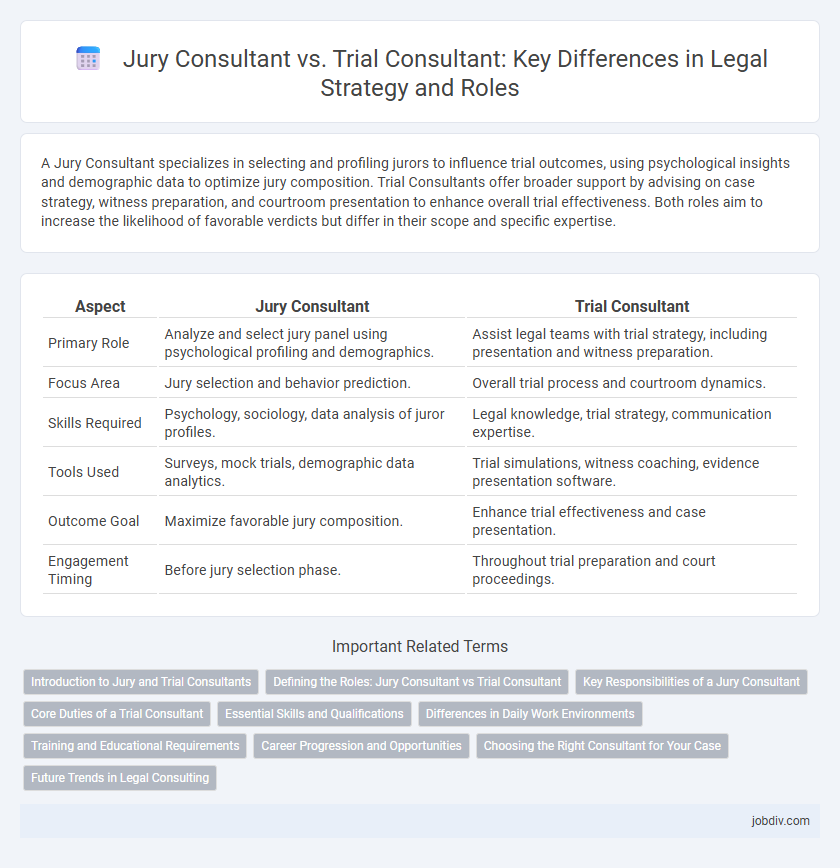A Jury Consultant specializes in selecting and profiling jurors to influence trial outcomes, using psychological insights and demographic data to optimize jury composition. Trial Consultants offer broader support by advising on case strategy, witness preparation, and courtroom presentation to enhance overall trial effectiveness. Both roles aim to increase the likelihood of favorable verdicts but differ in their scope and specific expertise.
Table of Comparison
| Aspect | Jury Consultant | Trial Consultant |
|---|---|---|
| Primary Role | Analyze and select jury panel using psychological profiling and demographics. | Assist legal teams with trial strategy, including presentation and witness preparation. |
| Focus Area | Jury selection and behavior prediction. | Overall trial process and courtroom dynamics. |
| Skills Required | Psychology, sociology, data analysis of juror profiles. | Legal knowledge, trial strategy, communication expertise. |
| Tools Used | Surveys, mock trials, demographic data analytics. | Trial simulations, witness coaching, evidence presentation software. |
| Outcome Goal | Maximize favorable jury composition. | Enhance trial effectiveness and case presentation. |
| Engagement Timing | Before jury selection phase. | Throughout trial preparation and court proceedings. |
Introduction to Jury and Trial Consultants
Jury consultants specialize in analyzing potential jurors' backgrounds, attitudes, and behaviors to assist attorneys in jury selection and trial strategy development. Trial consultants offer broader services including witness preparation, trial presentation design, and post-trial analysis to enhance overall courtroom effectiveness. Both roles utilize psychological research, data analytics, and mock trials to improve case outcomes and client success.
Defining the Roles: Jury Consultant vs Trial Consultant
Jury consultants specialize in analyzing potential jurors' demographics, attitudes, and behaviors to assist legal teams in jury selection and improve trial outcome predictions. Trial consultants provide broader support, including witness preparation, courtroom presentation strategies, and overall case analysis to enhance trial effectiveness. Both roles are critical in high-stakes litigation, with jury consultants focusing on juror insights while trial consultants address the comprehensive trial process.
Key Responsibilities of a Jury Consultant
Jury consultants analyze potential jurors' demographics, attitudes, and behaviors to assist legal teams in selecting favorable juries for trial proceedings. They conduct mock trials, develop juror profiles, and provide strategic advice based on social science methodologies to influence jury selection outcomes. By interpreting psychological and sociological data, jury consultants enhance case presentation and improve trial strategies tailored to juror perceptions.
Core Duties of a Trial Consultant
Trial consultants specialize in jury selection, trial strategy, witness preparation, and courtroom communication to enhance case outcomes. They analyze juror behavior and attitudes, conduct mock trials, and provide expert advice on presentation techniques tailored to legal teams. Trial consultants also assist in evidence organization and help attorneys craft persuasive narratives for judges and juries.
Essential Skills and Qualifications
Jury consultants must excel in psychological analysis, expertise in social dynamics, and proficiency in jury selection techniques to predict jury behavior effectively. Trial consultants require strong skills in case strategy development, evidence presentation, and courtroom technology utilization to enhance trial outcomes. Both roles demand qualifications in psychology, law, or communications, alongside experience in legal procedures and client interaction.
Differences in Daily Work Environments
Jury consultants primarily analyze jury selection, conduct mock trials, and assess potential juror biases to influence trial outcomes. Trial consultants have a broader scope that includes witness preparation, courtroom presentation strategies, and legal team coaching. The daily work environment for jury consultants often involves research and analysis outside the courtroom, while trial consultants frequently collaborate directly in court settings during trial proceedings.
Training and Educational Requirements
Jury consultants typically require specialized training in psychology, communication, or social sciences to effectively analyze jury behavior and dynamics, often holding advanced degrees such as a Master's or Ph.D. in these fields. Trial consultants also need a strong educational foundation but focus more on legal knowledge, trial strategy, and courtroom procedures, frequently possessing law degrees combined with expertise in forensic psychology or litigation support. Both roles demand continuous professional development through workshops, certifications, and real-world experience to stay current with evolving legal standards and jury research methodologies.
Career Progression and Opportunities
Jury consultants specialize in assessing potential jurors through psychological profiling and demographic analysis to influence trial strategy, often beginning their careers in psychology or social sciences before advancing into legal consulting firms or independent practice. Trial consultants offer broader services, including litigation strategy, witness preparation, and courtroom presentation, allowing for diverse career paths in law firms, consulting agencies, and corporate legal departments. Career progression in these roles typically involves gaining courtroom experience and expanding expertise in legal procedures, client management, and data analytics to move into senior advisory or executive consulting positions.
Choosing the Right Consultant for Your Case
Selecting the right consultant for your case hinges on understanding the distinct roles of a jury consultant and a trial consultant. Jury consultants specialize in analyzing juror behavior, demographics, and attitudes to assist in jury selection and develop persuasive strategies tailored to the jury profile. Trial consultants offer broader services including mock trials, witness preparation, and courtroom presentation techniques to enhance overall trial strategy and maximize chances of a favorable verdict.
Future Trends in Legal Consulting
Jury consultants and trial consultants are increasingly integrating artificial intelligence and data analytics to enhance jury selection strategies and trial presentations. Emerging trends emphasize the use of virtual reality simulations and behavioral profiling to predict jury responses more accurately. Legal consulting is shifting towards a more technology-driven approach, improving case outcomes through advanced psychological insights and data-driven decision-making.
Jury Consultant vs Trial Consultant Infographic

 jobdiv.com
jobdiv.com